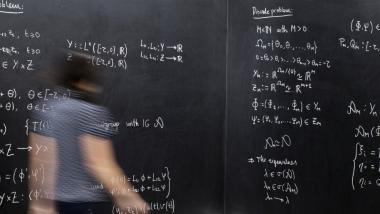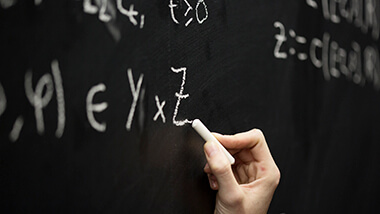HA
Harmonic Analysis and inverse problems
This research line consists of two teams working on the field of harmonic analysis and the resolution of inverse problems arising in partial differential equations (PDEs).
Modern harmonic analysis is a very active field of research which has reached a state of maturity that places itself in a central position within the mathematical sciences. Although the origin of harmonic analysis goes back to the study of the heat equation (through Fourier theory), harmonic analysis today has many interconnections with many areas of mathematics like PDEs, operator theory or complex analysis. Often, harmonic analysis plays an important role when the scenarios are not very friendly as those where there is a lack of smoothness. Some of these problems lead, for instance, to obtain the boundedness of certain singular integral operators in various spaces or the study of variants of Poincaré-Sobolev inequalities in rough contexts.
The main goal in inverse problems is to model some remote sensing strategies, non-destructive testing, or medical imaging techniques, to contribute in their developments, and propose possible improvements. Roughly speaking, one wants to determine the physical properties of a medium by non-invasive measurements. In mathematical terms the aim is to determine the coefficients of the equations describing a specific phenomenon, given some admissible knowledge of their solutions. Typically, the coefficients represent the medium and the information of the solutions is only accessible through non-invasive measurements.
Harmonic analysis team:
We consider different aspects of the so called Calderón-Zygmund theory. We study qualitative and quantitative properties of some of the most central operators in harmonic analysis such as singular integrals, commutators of these operators, square or maximal functions. In particular, we study the special relationship between the operator norm of these operators and the growth of the A_p constants or their variants in different natural spaces involving weights. We consider connection with extrapolation theory, reverse Hölder and other properties of the Muckenhoupt A_p class of weights. Applications in connection with the theory of degenerate Poincaré-Sobolev inequalities related to the regularity theory of (degenerate) elliptic PDE play a central role. The ambient of study is the Euclidean case, but also other settings like metric spaces or locally compact groups are considered. We mainly focus in the most classical linear theory where we address some striking questions and open problems but we also consider multilinear aspects of the theory due to the potential applications to PDEs.
In a different direction we also tackle several aspects related to elliptic and parabolic equations of local and nonlocal nature, from an analytic point of view. In such a way, we study trace Hardy and Hardy-type inequalities, their relation to solutions of the extension problem and the connection with eigenfunctions of Laplace-Beltrami operators. These investigations are accomplished in the Euclidean case and in more abstract settings like the Heisenberg group.
Issues related to discrete harmonic analysis and its applications to discrete PDEs are also developed, in particular the study of the connection between the discrete and continuum settings.
Inverse problem team:
We mainly study inverse scattering problems and inverse boundary value problems. The basic difference between these problems consists of the nature of the available data. In the inverse scattering theory the data is a measure of how an inhomogeneous medium scatters certain incoming waves or particles. In the case of inverse boundary value problems the data is a measure of the boundary values of the corresponding solutions. One of the main theoretical question on inverse problems is to state the assumptions that make it possible to determine the coefficients from the available data. These assumptions usually refer to the nature of the coefficients (scalar, vector or tensor functions) and their regularity (continuity, differentiability, integrability). Our goal is to apply and develop a set of tools and techniques that allows to solve inverse problems under weak assumptions on the coefficients.
Topics in Harmonic Analysis; Commutators and directional singular Integrals






